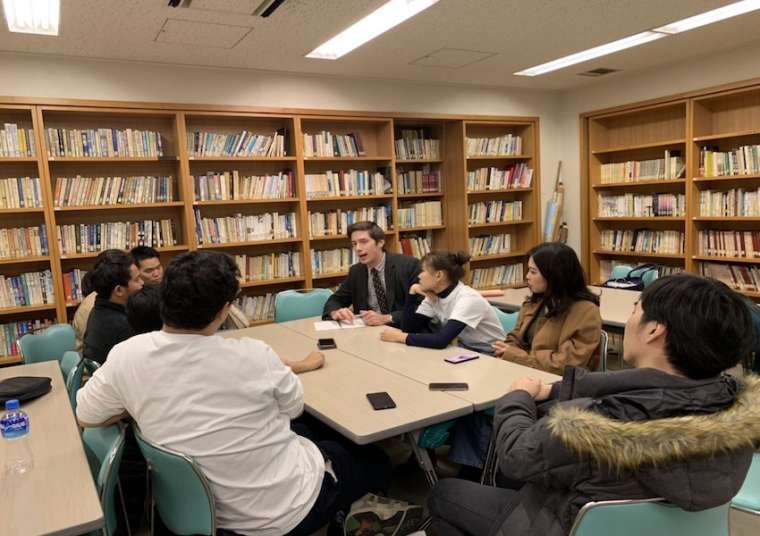Japanese Catholic youth: 'We want to reach people
“Most Japanese people don’t know we exist,” said Minori Takeuchi recently.
Dec 06, 2019

TOKYO: “Most Japanese people don’t know we exist,” said Minori Takeuchi recently.
“Or they think we are connected to cults. They think, ‘You must be dangerous! Or crazy!’ They don’t say it but –”
Minori, 22, is the college student who started Tokyo Christian Vox, a Youtube channel aimed at providing more religious content for Catholics in Japan. She translates, shares, and uploads videos on Catholicism for a Japanese speaking audience.
She’s also a student at Sophia University, Japan’s premier Catholic college, whose reputation rivals even that of National Universities, the Japanese equivalent to the Ivy League.
Minori called together a ragtag group of students and local parish members in the small library of Joseph Hall for an interview with Catholic News Agency a few days before Pope Francis arrived in the country for a visit Nov. 23-26.
Some spoke English, some spoke Japanese, and some switched rapidly between the two.
The group of about ten Catholic youth leaders talked about the state of the Church and the problems that young Catholics are facing in Japan today.
“When I was in junior high school, I was in the baseball club. I was not able to go to church except for Easter and Christmas,” said Kazuki, 20, a Sophia student.
“Japanese people don’t want to be different from others.”
Juno Matsumoto, 22, was in the basketball club around the time of her First Communion. In order to attend her own ceremony, she was required to miss an important basketball game, an uncommon and generally unaccepted experience in Japanese society, in which youth participation in clubs is heavily emphasized.
Juno’s parents forced her to skip the match and Juno became upset at how it would affect her and her team. She cried and refused several times to receive the Eucharist.
“I still have trauma,” she said about the struggle.
Juno believes that social media’s popularity in Japan can be an opportunity for young believers to feel “normal,” and develop a network of friends in a country where meeting young Catholics can be tough.
“I used to stay away from the Church when I was a junior high school and high school student,” said Yuhki Iizaka, a 26 year old Catholic in Tokyo. Yuhki had attended Mass weekly while in elementary school, but moving into junior high school culture changed him.
“What got me back to church was music. Somebody said there will be a folk Mass, so I heard that you could play the drums. I played the drums and everyone seemed happy to see me again.”
“For me, music is a bond to the church.”
Joshua Kurniawan, 24, works in Tokyo and participates in youth-oriented Catholic events.
Joshua said he was looking forward to an upcoming discussion among Catholic youth on using their natural talents for the propagation of the faith. The small seminar featured a speaker from the Philippines, singing, and bonding exercises for those in attendance.
However, for every student and worker in the community forming strong bonds within the church, there are many more hovering on the outskirts and not engaged fully with the group.
Naoya Okuda, 25, is a student leader at Sophia University, and oversees several group chats on the popular messaging app Line. The chats are geared towards forming groups of support for Catholic students. But not everyone who signs up is active.
“In my [parish], half of them don’t come [to] church. They don’t comment on Line, they don’t come,” he said.
“We have 60 or 70 members, but half of them –,” Naoya cuts off. “It’s difficult to say they lost interest, but they’re busy with a job, or children.”
Naoya also manages a student group on Facebook with 165 members.
Shiori Kimura, 34, a Catholic woman who works as a nursery school teacher in Tokyo, runs a Youtube radio show called “KatoRaji.” The name is Japanese portmanteau that means “Catholic Radio.”
On the show, she regularly talks to a priest about the liturgy. They use the show as a way of educating non-Catholics on the basics of Catholic theology, but it’s also an attempt to reach out and catch those who feel for one reason or another that they can’t make it to Sunday services.
“We want to reach people who are too busy to go to church,” Shiori said with a sad, polite smile.
Shiori also spoke up about an issue she sees in the way the Japanese media has addressed Pope Francis this visit.
“The news calls him the ‘Roman Pope,’” said Shiori. “It’s weird to hear.”
Many news outlets in Japan and some social media users attach the “Roman” label to Pope Francis’s title, specifying his domain. Shiori feels that this unnecessarily limits someone who should be seen as a universal spiritual leader, the leader of a faith transcending borders.
The nomenclature used for the pope in Japanese is a frequent source of irritation for Catholics who speak the language.--CNA







Total Comments:0